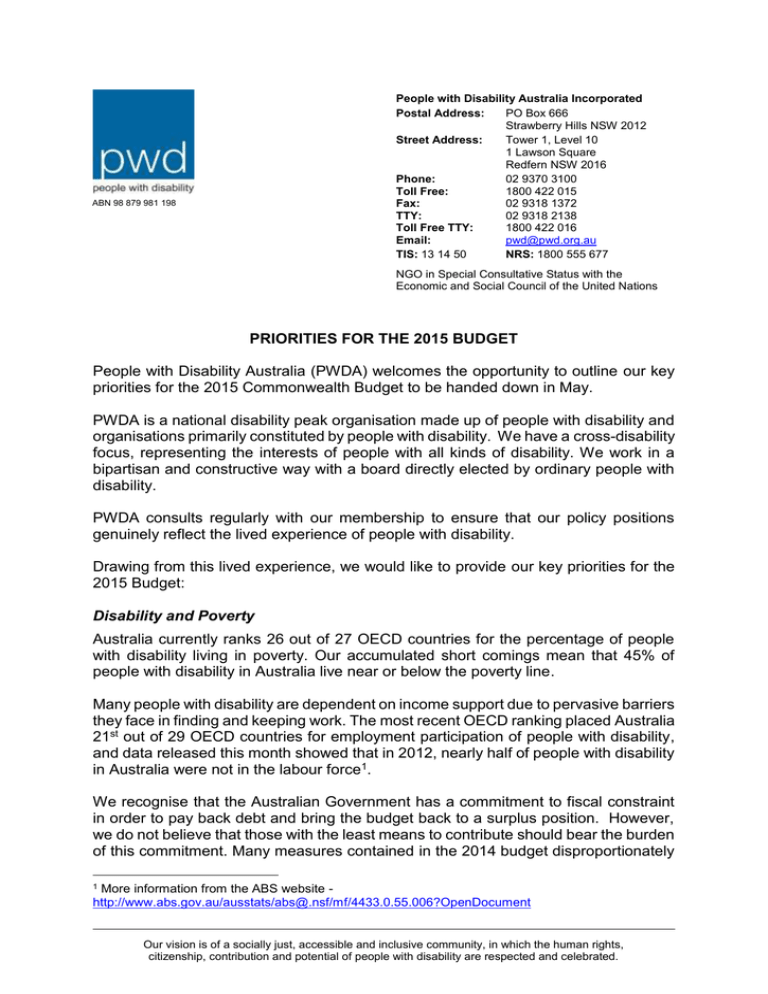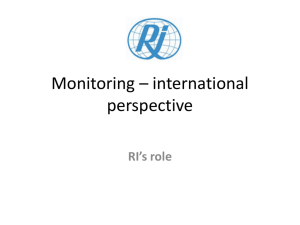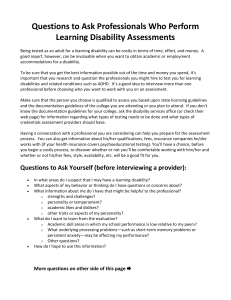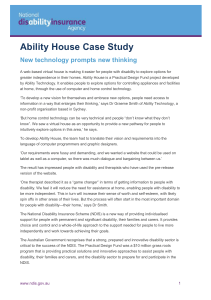PWDA 2015 Federal Budget Submission
advertisement

People with Disability Australia Incorporated Postal Address: PO Box 666 Strawberry Hills NSW 2012 Street Address: Tower 1, Level 10 1 Lawson Square Redfern NSW 2016 Phone: 02 9370 3100 Toll Free: 1800 422 015 Fax: 02 9318 1372 TTY: 02 9318 2138 Toll Free TTY: 1800 422 016 Email: pwd@pwd.org.au TIS: 13 14 50 NRS: 1800 555 677 ABN 98 879 981 198 NGO in Special Consultative Status with the Economic and Social Council of the United Nations PRIORITIES FOR THE 2015 BUDGET People with Disability Australia (PWDA) welcomes the opportunity to outline our key priorities for the 2015 Commonwealth Budget to be handed down in May. PWDA is a national disability peak organisation made up of people with disability and organisations primarily constituted by people with disability. We have a cross-disability focus, representing the interests of people with all kinds of disability. We work in a bipartisan and constructive way with a board directly elected by ordinary people with disability. PWDA consults regularly with our membership to ensure that our policy positions genuinely reflect the lived experience of people with disability. Drawing from this lived experience, we would like to provide our key priorities for the 2015 Budget: Disability and Poverty Australia currently ranks 26 out of 27 OECD countries for the percentage of people with disability living in poverty. Our accumulated short comings mean that 45% of people with disability in Australia live near or below the poverty line. Many people with disability are dependent on income support due to pervasive barriers they face in finding and keeping work. The most recent OECD ranking placed Australia 21st out of 29 OECD countries for employment participation of people with disability, and data released this month showed that in 2012, nearly half of people with disability in Australia were not in the labour force1. We recognise that the Australian Government has a commitment to fiscal constraint in order to pay back debt and bring the budget back to a surplus position. However, we do not believe that those with the least means to contribute should bear the burden of this commitment. Many measures contained in the 2014 budget disproportionately 1 More information from the ABS website http://www.abs.gov.au/ausstats/abs@.nsf/mf/4433.0.55.006?OpenDocument Our vision is of a socially just, accessible and inclusive community, in which the human rights, citizenship, contribution and potential of people with disability are respected and celebrated. affected people on low incomes, including people with disability and we strongly recommend that this not be repeated in the 2015 Budget. The Social Security system should provide a safety net to those who require income support. This safety net should provide for an adequate standard of living and prevent poverty. The Government is currently looking at the reform of the welfare system, but rather than wait for outcomes of this review process, measures introduced in the 2014 budget appeared to be solely aimed at cost cutting rather than being part of a wider, evidence based welfare reform agenda. For example, recent changes to Disability Support Pension (DSP) portability requirements have led to perverse outcomes. Although this measure was originally meant to save $12.3 million, it will now reportedly cost $15.9 million, as well as disadvantage people with disability who may require extra travel time to visit family overseas or undertake medical treatment not available in Australia. In addition, evidence is yet to show that increasing participation requirements for people aged under 35 on DSP is leading to better employment outcomes, however the Government is already proposing extending these requirements to other DSP recipients in the upcoming budget. People with disability are already ‘doing it tough’ and it is critical that the 2015 Budget does not contain measures that further entrench poverty for people with disability. Revenue measures PWDA argues that a fairer way to achieve a surplus position would be to focus on revenue measures which would bring in sustainable income over the long term, rather than introducing further cost cutting budget measures targeting people on the lowest incomes, including people with disability. As a member organisation of the Australian Council of Social Services (ACOSS), PWDA has contributed to ACOSS business and community sector discussions regarding taxation reform. The ACOSS 2015 Federal budget submission2 reflects these discussions, and proposes measures that target wasteful spending, including tax expenditures which predominately benefit people on the highest incomes. The ACOSS recommendations would raise around $13 billion and not shift the burden on to those who are already ‘doing it tough’, and who were the focus of the 2014 Budget measures. PWDA endorses the recommendations made in the submission by ACOSS. The National Disability Insurance Scheme (NDIS) As a national insurance scheme the NDIS recognises that any Australian may have disability at some point in their life, and that the scheme to provide disability supports should be available to, and paid for by, everyone. The Coalition Government’s election commitment towards the full implementation of the NDIS was demonstrated through 2 ACOSS 2015 Budget submission can be found here http://www.acoss.org.au/images/uploads/ACOSS_2015_Budget_Priorities_Statement_FINAL.pdf 2 of 8 the 2014 budget and forward estimates, and PWDA publicly congratulated the Government on this. It is critical that the NDIS be funded in full, but we strongly reject measures that would seek revenue to fill any perceived or potential shortfall through a shift in revenue from other human services, such as aged care. The Aged Care Reforms currently underway are moving to a person centred approach to service delivery which provides choice and control to individuals. Whether an individual is provided with support under the aged care system, or through the NDIS, they must have access to the same quality and level of services. This will require an aged care system which is robust and fully resourced. We also strongly reject any measures that link a fully funded NDIS with the need to cut welfare spending. The NDIS and the welfare system are two fundamentally different systems with different purposes. The NDIS is an investment scheme into the future: it replaces a higher cost, broken disability system with a scheme designed to assist people with disability get the disability supports they need to engage in community life, get jobs and pay taxes. The NDIS will raise revenue and reap economic and social benefits that far outweigh costs. The welfare system is a safety net for people who require income support or replacement in times of need. It is disingenuous to link these two systems and to organise ‘trade-offs’ between the two in the 2015 budget. The Productivity Commission Inquiry into Disability Care and Support found that the welfare system should be kept separate from the NDIS. 3 PWDA strongly supports the retention of the Medicare Levy, which provides predictable targeted revenue for the NDIS. The current levy relief and exemption measures in place for low income earners and others should be maintained. Withdrawal of Commonwealth Disability Services PWDA is very concerned about the risks of premature withdrawal of Government services prior to the full roll out of the NDIS and the development of a quality assured, market driven model. In particular, we are concerned about the withdrawal of funding from national disability specific information services and the potential ‘sale’ of Australian Hearing: Tier 2 of the NDIS, now called Information, Linkages and Capacity (ILC) is currently being formalised before being rolled out across Australia. ILC is targeted at all people with disability, particularly those who will not receive funding packages through the NDIS but who will need targeted information, advice and linkages in order to successfully navigate the specialist and mainstream service system. The withdrawal of funding for national information services is a result of 2014 Budget measures. There is no existing market that people with disability can go to as an alternative. It is now likely that these services will not survive beyond the first few months of 2015, meaning that their expertise will not be incorporated into the ILC transition phase. We argue that NDIS transition needs to be managed to ensure that specialist expertise is not lost and people with disability are not left 3 http://www.pc.gov.au/inquiries/completed/disability-support/report 3 of 8 without essential supports. The funding required to maintain national information services is small scale at about $200,000. These services need to be maintained rather than be the subject of cost saving measures. We recommend that the 2015 Budget restore funding to national information services at least until full NDIS transition, and in particular until ILC is finalised. The Government is currently reviewing its ownership of Australian Hearing. Australian Hearing provides essential hearing services, research and targeted programs for Aboriginal and Torres Strait Islander communities, children and young people with disability, adults with complex hearing rehabilitation needs. PWDA is very concerned about the risks involved in the potential sale of this Government asset to the private sector: the loss of specific audiology expertise, reduced service access for people living in rural and remote Australia, loss of service quality, clinical programs and research that do not increase profits, and the risk that the need for profit margins will result in increased consumer costs; increased costs will result in an increase cost of providing services under the NDIS, and many people are concerned that the services they receive will be reduced in order to pay a commercial rate to the private provider. The decision on the sale of Australian Hearing should not rest on decisions about revenue raising measures. Any proposed changes to existing arrangements must be made in the context of the impact on the lives of people who are hearing impaired or Deaf. Decisions must also be made from an evidence base. In this respect we note that the draft Competition Policy Review Report released in September 2014 prioritised reforms in the human services sector focused on placing user choice at the heart of service delivery, separating funding, regulation and service delivery, encouraging a diversity of providers and stimulating innovation4. PWDA recommends that the 2015 Budget exclude the sale of Australian Hearing from its measures. Any decision to sell Australian Hearing should be evidence based, and “contingent on there being appropriate arrangements in place to ensure that services to the vulnerable groups accessing services are maintained or enhanced, and that the research undertaken by the National Acoustic Laboratories continues”.5 Income and employment support The Government is yet to release the final report of the Reference Group on Welfare Reform. PWDA provided input to the Reference Group, and we maintain our view that any reform must ensure that social security be available to all who need it, and provide for an adequate standard of living in relation to the rest of the community. This safety net is particularly important for people with disability who face profound and complex barriers to participation. 4 Draft Competition Policy Review Report p. 140 http://competitionpolicyreview.gov.au/draft-report/ Deafness Forum of Australia, http://www.deafnessforum.org.au/index.php/issues/112uncategorised/245-submissions 5 4 of 8 The reality is that for some people with disability, the barriers to participation are so great that they will be dependent on income support over the long term. The Disability Support Pension (DSP) provides for a basic standard of living, with little room for luxuries or savings. PWDA strongly reject proposals to index the DSP to the Consumer Price Index (CPI) rather than wages. This would mean that rather than being supported to live in dignity, people with disability dependent on income support would fall further behind the living standards of the rest of the community. In addition, we reject proposals to raise the pension age to 70. This would see increasing numbers of people with disability as well as older people with disability forced to survive on Newstart payments, particularly for those who have been longterm unemployed and cannot self-fund retirement. We support the recommendations of the wider community sector6 for the base rate of income support (Newstart) to be increased, and that this be indexed to wages. Evidence shows that this base rate has not kept pace with increasing living costs7. Tightening eligibility for the DSP has resulted in increasing numbers of people with disability being dependent on Newstart. These people struggle to survive on a payment that in no way accounts for the additional costs associated with disability 8. Whilst the 2014 budget measures increased participation requirements for certain DSP recipients, these increasing participation requirements are not being met with incentives and support for people with disability. For example, DSP recipients are not eligible for Jobs, Education and Training (JET) childcare payments, whilst people receiving Newstart are not. This presents barriers, for example to prospective students with disability who have young children. In addition, the 2014-15 budget proposed the cessation of the Pensioner Education Supplement (PES), which currently provides 18,700 DSP recipients with financial support to cover costs associated with vocational training and tertiary education. If PES is stopped, many people on the DSP will have to fund their study costs out of their income support payments, which will mean that enhancing training and skills to move into employment will be prohibitive. PWDA urge the Government to dedicate resources towards the development of a comprehensive Jobs Plan9 for people with disability, which supports and incentivises people with disability towards long-term employment. As part of this Jobs Plan, PWDA supports strategic investment in areas which will increase public sector employment participation including our suggestion of a paid parliamentary internship scheme to lift the profile and presence of people with disability. We also continue to advocate for measures to alleviate the cost of disability. 6 ACOSS 2015 Budget submission p. 10 ACOSS Poverty report 2014 http://www.acoss.org.au/images/uploads/ACOSS_Poverty_in_Australia_2014.pdf 8 http://www.smh.com.au/national/hidden-crisis-of-long-term-joblessness-worsens-201502011330gk.html 9 PWDA’s platform ‘Get Real on Jobs’ provides more details on potential areas of focus http://www.pwd.org.au/pwda-publications/get-real-on-jobs2.html 7 5 of 8 People with disability need access to employment services that meet their individualised needs and which are focused on long term outcomes for their clients. Disability Employment Services (DES) continue to deliver poor employment outcomes for people with disability, and the Government has committed to much needed reform of the DES system. The reforms are due to be completed by 2018, and to date the Department of Social Services (DSS) have been in dialogue with people with disability, employers and disability peak bodies regarding the design of the new employment support system. Ongoing resources must be committed over the next two years to support dialogue between all stakeholders to ensure that the new employment support structure offers the best outcomes for people with disability. As part of this structure, PWDA supports trialled unbundling of DES to provide a more effective and responsive approach at the NDIS interface. This will require some upfront investment but yield savings. With individualised funding provided through the NDIS, some people with disability will, for the first time, be able to consider their work options in the open employment market. Currently many people with disability are forced to work in Australian Disability Enterprises (ADEs), formally known as sheltered workshops, because their support services are tied to these organisations. ADEs segregate people with disability from the rest of the community, and workers do not receive equal pay for work of equal value or enjoy the same industrial protections as other workers. Under the NDIS, people with disability will be able to access support services when and where they need them, and this opens up new possibilities for employment. The reform of the DES system must be integral to the success of the NDIS, in terms of facilitating positive employment outcomes for all people with disability in the open employment market. In August 2014, Senator Mitch Fifield announced $173 million dedicated to support ADEs move to fairer wage system10. This money must be dedicated to ensuring that all employees of ADEs receive a fair award wage for the work that they undertake11. Healthcare People with disability with multiple health issues pay higher out of pocket expenses than the rest of the community. Evidence provided to the 2014 Senate Community Affairs Committee Inquiry into out of pocket costs in healthcare12 found that people with disability often delay seeking healthcare due to the cost, or make a choice between everyday essentials and meeting their healthcare needs. People with five or 10 Mitch Fifield media release can be found here - http://mitchfifield.dss.gov.au/media-releases/155 Further details can be found on the DSS website https://www.dss.gov.au/ourresponsibilities/disability-and-carers/program-services/for-people-with-disability/wage-assessments-inaustralian-disability-enterprises/bswat-payment-scheme 12 The report of the Senate Community Affairs Committee Inquiry into out of pocket expenses in healthcare July 2014 can be found here http://www.aph.gov.au/Parliamentary_Business/Committees/Senate/Community_Affairs/Australian_h ealthcare/Report 11 6 of 8 more chronic health conditions report spending up to $882 per quarter on out of pocket health costs. Early intervention and preventative health care is a sound investment for Government, reducing the cost implications from long-term sickness and disability. PWDA therefore have serious concerns about Government proposals to reduce GP rebates for patient consultations. As costs are passed on to consumers, people with disability and their families will face greater financial pressure to meet their medical needs. In addition, low income families will delay seeking treatment until health issues become more serious13, which will not only have significant personal impact on that person’s ability to work and engage in community life, but will also result in greater cost implications for the Government over the long term. Affordable and accessible housing Access to appropriate, affordable and accessible housing presents one of the greatest barriers to inclusion for people with disability, limiting participation in all aspects of life. PWDA notes the undersupply of affordable, accessible and universally designed housing and supports work with industry and attention to the tax treatment of housing investment to increase mainstream housing supply. Whilst the 2014 budget saw considerable investment in capital infrastructure, this did not include a commitment towards addressing this undersupply. Significant reforms in the disability and aged care sector will be undermined if the Government does not dedicate significant resources towards addressing the undersupply of affordable, accessible and universally designed housing. PWDA also urge the Government to invest in the expansion of a revised National Rental Affordability Scheme and increase the level of Commonwealth rent assistance to meet growing rents. The National Disability Strategy The National Disability Strategy (NDS) is the mechanism under which Australian Governments at all level are progressively implementing the United Nations Convention on the Rights of People with Disabilities (UNCRPD). A progress report on the implementation of the National Disability Strategy to 2014 is currently being undertaken and will be provided to the Commonwealth of Australian Governments (COAG) in 2015. As we enter the next stage of the Strategy, PWDA strongly recommends that the Government fully resource: the range of measures under the NDS; 13 An ABS survey found that 1 in twenty people delayed seeing a GP when they needed to because of the cost http://www.abs.gov.au/ausstats/abs@.nsf/mf/4839.0 7 of 8 a strengthened public reporting mechanism and transparent accountability measures within State and Territory agreements; and a policy engagement framework that enables people with disability and their representative organisations to be consulted on legislation and policy that affects their lives. Advisory and leadership mechanisms for people with disability PWDA welcomed the 2014 budget measure towards the establishment of a new Disability and Carers Industry Advisory Council.14 The Council would bring together industry, the service sector, peak bodies, people with disability and carers to work closely with Government and provide innovative advice. However, this Council has not been established to date. PWDA is concerned that with the demise of other advisory mechanisms, such as the National People with Disabilities and Carers Council and the National Disability Strategy Implementation Reference Group, there are no formal engagement mechanisms for people with disability to provide advice and feedback to Government on key reform agendas. PWDA recommends that the 2015 Budget retains measures and funding allocations for the establishment of the Disability and Carers Industry Advisory Council. The lack of a formal mechanism for engagement with Government is compounded by the loss of leaders or champions within Government who strongly promoted the rights of people with disability. PWDA remains deeply disappointed and concerned that the dedicated position of Disability Discrimination Commissioner was an outcome of measures in the 2014 budget.. 40% of complaints received by the Australian Human Rights Commission are related to disability discrimination15, with half of those complaints relating to employment discrimination. At a time when the national disability landscape is undergoing such significant change, and when people with disability are under increasing pressure to find and keep work, a dedicated full-time Disability Discrimination Commissioner is critical to identify and address systemic disability discrimination and to promote public dialogue on issues and concerns for people with disability. We strongly urge the Government to provide funding in the 2015 Budget and forward estimates for a dedicated full-time Disability Discrimination Commissioner. 14 DSS Budget paper p.23 https://www.dss.gov.au/sites/default/files/documents/05_2014/20142015_dss_pbs.pdf 15 http://www.abc.net.au/news/2014-05-29/disability-advocate-says-sector-will-suffer-withoutrepresentati/5486604 8 of 8









